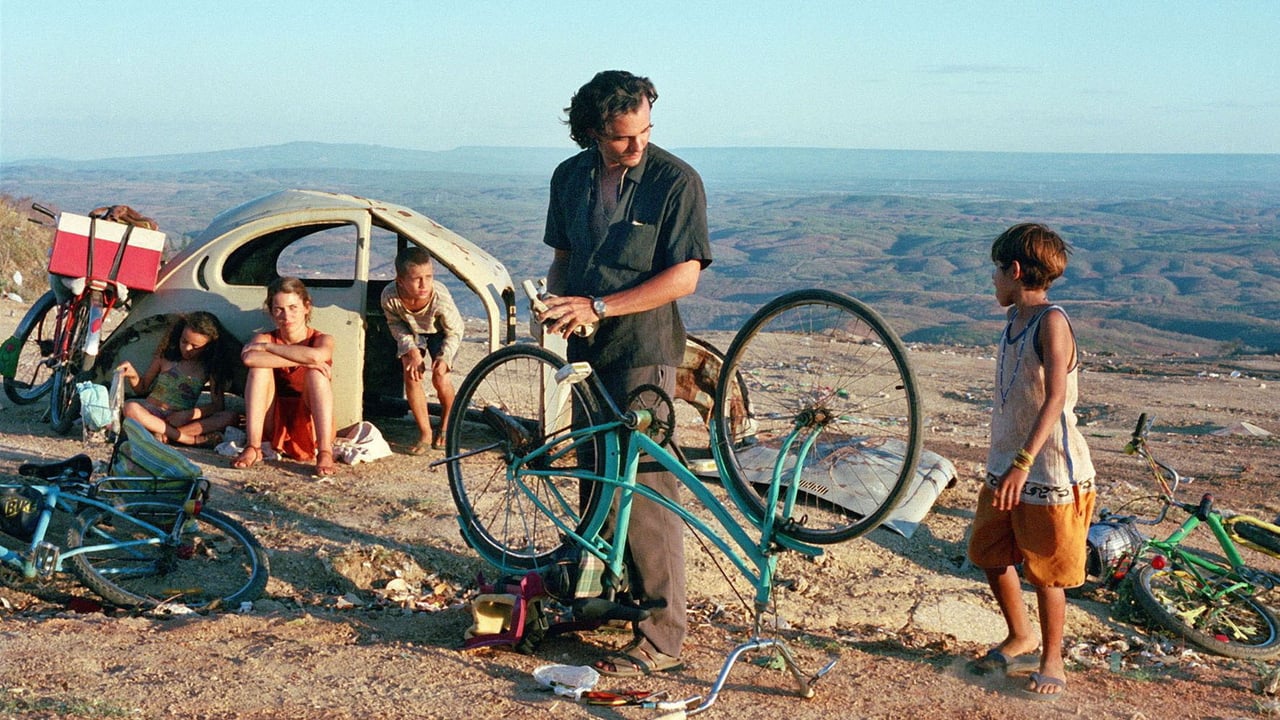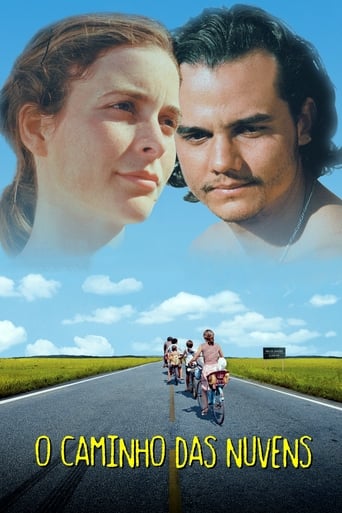



Am I Missing Something?
Easily the biggest piece of Right wing non sense propaganda I ever saw.
View MoreA great movie, one of the best of this year. There was a bit of confusion at one point in the plot, but nothing serious.
View MoreThe storyline feels a little thin and moth-eaten in parts but this sequel is plenty of fun.
View MoreThis is the (based on a true) story of a peasant family from northwest Brazil that migrates to Rio. They travel not how people usually do it, but as a family, on bicycles. Five children, mom and Dad, on five bicycles. Six months it takes them, and 3000 kilometers.It's a wonderful premise for a movie, and I was disposed to like it. I've liked other films about NE Brazil. Vidas Secas by Nelson Pereira dos Santos; Me, You, Them by Andrucha Waddington; Central Station by Walter Salles. I'd like to take another look at the Glauber Rocha films if they ever become available.But this well intentioned film just didn't make it for me. The actors were too pretty, too handsome, their teeth too perfect and white, their bodies conditioned in a gym, their faces unburnt by a lifetime in the sun. They were too clearly actors in a created scene that was too foreign to them. They just failed to meaningfully embody their characters. It felt like they were following a recipe for acting: recite lines, add so much of this or that emotion, make meaningful glances, and voila, soufflé.In general, the "acted" scenes filmed in a studio didn't' feel right. They felt more like a mediocre made-for-TV telenovela.The filmmakers missed the real grit of the sturm und drang of surviving on the road by your wits and your faith. Very few close-ups. The bicycles, for example: we never saw a greasy hand or a wrench or a spoke. The rich texture of the side of the road was strangely missing, such as the people who make huge pots of tripe and rice and beans and sell it to the truck drivers, half the price of restaurant food.But the gravest mistake was the filmmakers attempt to make the picaresque, true story of a migration/pilgrimage fit into ready-made story lines, including one especially lame subplot about the coming-of-age of the oldest boy, Antonio, his conflict with the father. The eventual resolution of the conflict between father and son was downright bathetic. Saccharin-sweet sentimentality.The scenes of Brazil were great. The roads, the berm, the sand, the daub and wattle, the life-beside-the-flow of the river/road, the landscape, the cactus, the hot dreamy little towns and villages with their brick streets and bright colors. But still, a little too pretty. I know the scene. I lived in rural northwest Brazil for 4 years and did 80,000 kilometers of traveling in Bahia. I lived in Feira de Santana for a few months, and that city is part of the movie. I love that part of the country and its people. I liked the scenes of Juazeiro.One scene that totally failed for me was the whole "Panama" episode. It felt like it was written into the script.The script as a whole was predictable. The attempts at character development seemed to come from the writing. Each time our travelers learn a new lesson, the filmmakers make them stand up and announce it.The film would have worked better in documentary style, like say Slumdog Millionaire. Imagine if the filmmakers had paused a little more to explore the details of the roadside in northeast Brazil?
View MoreThis movie is pointless. There is no story here that hasn't already been told. None of the characters are sympathetic. The man is a complete moron macho who refuses to get a job and as usual the woman is left to take care of the 100 kids they had together. I can see why foreigners will see this and think it's magical... The photography is beautiful but that's about it. It is misogynistic and not a fairy tale. The only thing that father taught his kid was how to smoke a cigarette at the age of 12!!!? It was upsetting and there was no redeeming qualities about him either. At the last scene when they finally get to Rio, the husband asks someone how to get to Brasilia and the wife finally says we're not going anywhere, we traveled for six months to get here. This last line was delivered as a punchline to a bad joke. It was supposed to be cute I guess. It wasn't. The story is predictable and unrealistic.It's a shame that this was funded by the Brazilian government.
View MoreA great Brazilian movie called "The Middle of the World", which, in fact, it is in so many ways. It is a rich but unpretentious chronicle of an extraordinary journey of one rural Brazilian family. The father is illiterate and unable to find work. Romão (the father), Rose(the mother), and their five children, from a teen to a baby, begin to make a journey on bicycles and head for Rio de Janeiro, which is 2,000 miles away, to find work. They face all kinds of physical and emotional hardships along the way, seeing many kinds of villages, dirt roads and superhighways, and desolate to spell binding scenes of nature. They beg, do odd jobs, sing in outdoor cafés for money, scrounge around in old abandoned homes, swelter under the blazing sun, almost die of thirst, and sleep under the stars; yet all the while, they keep trying to survive and maintain their love for each other, which is often tested beyond limits. The husband and wife relationship has classic features that are displayed poignantly and expertly. They exhibit a kind of yin and yang pattern with Romão being a strong, soft spoken, intensely patient, idealistic optimist and Rose being the one who verbalizes their feelings of love, sympathy, joy, as well as despair, fear, and anguish. She is also outspoken when their frailties have been overtaxed and when there is a need to be practical. Her pragmatism and his religious convictions balance each other out. Nevertheless, they are able to switch roles as the one to comfort, encourage, or recommit to the challenge when either has had enough and is losing hope and faith in their vision. With no competition from age-group peers, the character of their parents seems to be emulated as role models by the children. As a sub-plot, the teenager, Antonio, is in the middle of growing into manhood. The Father, Romão, exercises patient parental control through mild rebukes and testing Antonio's mettle by letting him use his judgment and make mistakes, but he also subtly guides him with silent looks of acknowledgement that builds Antonio's confidence in himself. Rose, the mother, gives equal guidance by emphasizing caution and protectiveness but also gives him a sense of profound mother-love that becomes his foundation of security. When the father senses Antonio is ready to emancipate, the mother does not want to let go and the father, in his wisdom-love, states simply and firmly to Rose, "We do not own our children." When Antonio is left behind to follow an occupation, the strong and positive family dynamic continues to the end of their journey. Finally, when at their destination of Rio de Janeiro, and expressing the powerful spirit of this family, their triumph is symbolized in a mountain top experience as they stand together viewing Corcovado's Statue of the Christ and overlook the prize of their victory, the city of their dreams. As they crossed the 2,000 miles of their courageous journey, they witnessed the many ways in which the nation they once knew is rapidly changing. It was a raw, earthy, beautiful story. It gave such a realistic picture of Brazil as a whole. It is a beautiful country but also has such vast differences between the rich and poor. The movie also showed what a big and truly dominant role religion, and religious superstitions, plays in the lives of the poor, illiterate 'peasants'. At 'The Middle of the World', two different worlds, the new cosmopolitan and the old world, stand on the same piece of earth!
View MoreI though this movie was going to be different. The trailer made me think that. But I was mistaken. The story of a poor family that travels on several bicycles 3200 kilometers to go to Rio de Janeiro where the man of the family hopes to get a job of 1000 reales to feed the necessities of the family. Of course, the travel wasn't going to be perfect. We now that. Happens in every road movie. The problems of this movie are: 1) You know from the beginning towards the end what is going to happen. 2) Performances. There isn't any performance with at least a grade of intensity. The family is not portrayed like people desperate to survive. I mean, it is a long travel and they go on a bike. 3) Photography. When I look to the sky I thought that was painted, NOT real. The clouds seemed to be painted too. Maybe towards the end of the movie you could find a CREDIBLE image. 4) Resuming: all of these factors should have made a true real movie. It is just the opposite. At least, the woman and the boy sang very very well. 2 out of 10. Andres.
View More